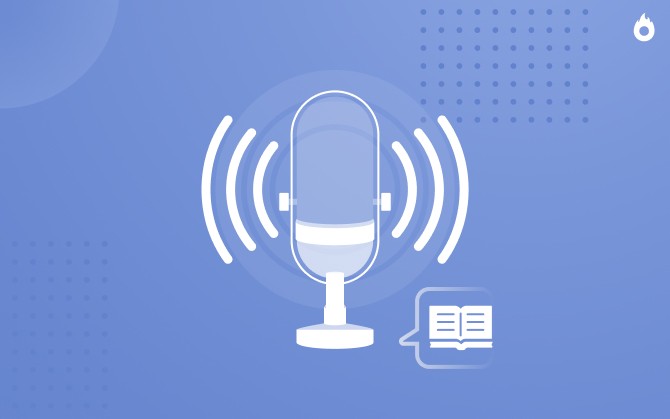
How to narrate an audiobook: 7 tips to create an audiobook
Learn the top tips to skillfully narrate an audiobook.

What will we see in this post
Audio content is gaining more and more space on the internet. Besides providing in-depth information, audiobooks are ideal during the rush of our everyday lives, as they can be listened to while doing something else.
You can listen to an audiobook on your way to work, while working out at the gym, or even while preparing a meal. The convenience of this format has become more popular in a sea of thousands of other, more complex, formats that require more time and attention.
However, good audio quality requires care to be taken when recording. So, today, you’re going to learn how to narrate an audiobook!
First, what is an audiobook?
An audiobook is the narration of a book, in which the written content is adapted for a strictly audio version.
A narrator or actors can narrate the full book or a summarized version. It all depends on the book and the objective.
The sectors that most invest in audiobooks are literature, language courses, and educational content. Currently, a lot of content creators are also creating audio versions of their ebooks and other written material.
Why is the quality of an audiobook important?
Imagine this situation: you’re listening to an audiobook about recipes and in the middle of a recipe there’s some noise in the recording.
Besides not being able to hear all steps of the recipe, the audio won’t be nice to listen to, and in the end, you won’t recommend it to anyone.
Clean, clear, objective sound that guides the listener well is key to generating greater connection and identification and transmitting your message appropriately. This ultimately increases your brand’s authority and proves your mastery of the subject and the content you’re providing.
Narrating an audiobook with precision also avoids communication failures. Users will consume the content without any technical problems that impede accurate understanding of what was said and discourage them from listening to the end.
7 tips to skillfully narrate an audiobook
Are you ready to narrate an audiobook but need to ensure the quality of your content? Check out the 7 tips we’ve prepared for you!
1. Prepare a script
The script is crucial for a quality ebook. Without a script, your content may be hard to access, as it will not be that attractive for people looking for something in audio format.
At this point, you may be asking yourself: “but don’t I just need to narrate my written content?”. Each type of content requires a different structure to embrace different audiences, and ways of consumption… audiobooks are no different.
A text that is excellent for reading may not be as fluid when spoken. That’s why it’s necessary to develop a specific roadmap and adapt existing material.
Everything needs to sound clear. Eliminate images and captions that don’t make sense, rethink how to present graph data, and how to replace CTAs for smarter calls in this new digital product.
2. Practice, practice, practice!
Audiobooks are usually very dense and need adequate preparation at the time of narration. Fewer cuts and pauses ensure more linear intonation and more consistent content from start to finish.
Mistakes in diction and nervousness contribute to making you more uncomfortable when recording and not connecting as much with the audience.
There’s only one way to prevent this: a lot of practice! Read the entire script as if you were recording it, write down what needs improvement, and see if the text makes sense in your narration.
If possible, ask someone to listen while you practice, they’ll have a more critical ear and will be able to point out what’s good and what needs more attention.
3. Use quality equipment
It’s not just the narrator that needs to be ready to generate good content. Your equipment can greatly influence the final product.
Technical issues such as noise, muffled sound, poorly executed editing cuts, and very loud music can negatively impact your audio recording.
Use a good microphone and microphone filter. There are different models of microphones, such as lavalier and a directional mic that are used to record audio.
Have a computer and a program to record audio and edit, ensuring a good performance. Audacity is an excellent free program that you can use for this purpose.
4. Stay hydrated
Being hydrated helps in the narration of an audiobook… Can you believe it?!
Since a few hours and sometimes even days are required for recording, your voice needs to be spared and rested during the process.
Drink plenty of water to ensure your throat is not dry, but avoid cold drinks. With these precautions, your voice will last longer and provide a more fluid and pleasant sound to your recordings.
5. Maintain good posture
Posture helps keep you from losing your breath and maintains the pacing of your narration.
Your speech will also come out clearer and smoother, so don’t think it’s indispensable: maintaining good posture helps keep you from getting tired while reading.
If possible, do some stretching beforehand to stimulate circulation and make you more comfortable until the end of the recording.
6. Maintain the same tone of voice throughout the recording
An audiobook with several tones of voice is the same as a book that has been cut into several parts: the information, which is most important, ends up being lost.
Since no one wants disjointed and out-of-rhythm content, your tone of voice comes in exactly to talk to the right audience and bring them a more interesting dialogue.
Don’t forget that there is a way to talk to your listener that can be more relaxed, more formal, or more informative; it all depends on the purpose of the material and who is listening.
Create a vocabulary with words and expressions that can help in the construction of the script and use them as the basis for the entire audiobook.
7. Learn from criticism!
This tip is the cherry on top!
Narrating an audiobook requires care, and it’s normal for mistakes to be made. Feedback is always important for you to learn how to use criticism to your advantage and improve even more!
Every lesson learned is a new opportunity to put into practice what you learned. Thus, when your audiobook is finished, don’t forget to send it to some people and ask them for their honest opinion.
Narration is key for a good audiobook
In this post, we’ve told you how important good narration is for audiobooks. Like a bridge, speech can take information to listeners and guarantee a good understanding of the content that was presented.
That’s why we provided 7 tips that range from technical aspects, like having good equipment for recording and editing audio, to physical aspects that make a difference, like hydration and good posture.
We also talked about how noise and poor editing can interfere with the absorption of the content. Check out this post we prepared to ensure the sound quality of your recording!
This post was originally written in July of 2013 and has since been updated to contain more complete and accurate information.





